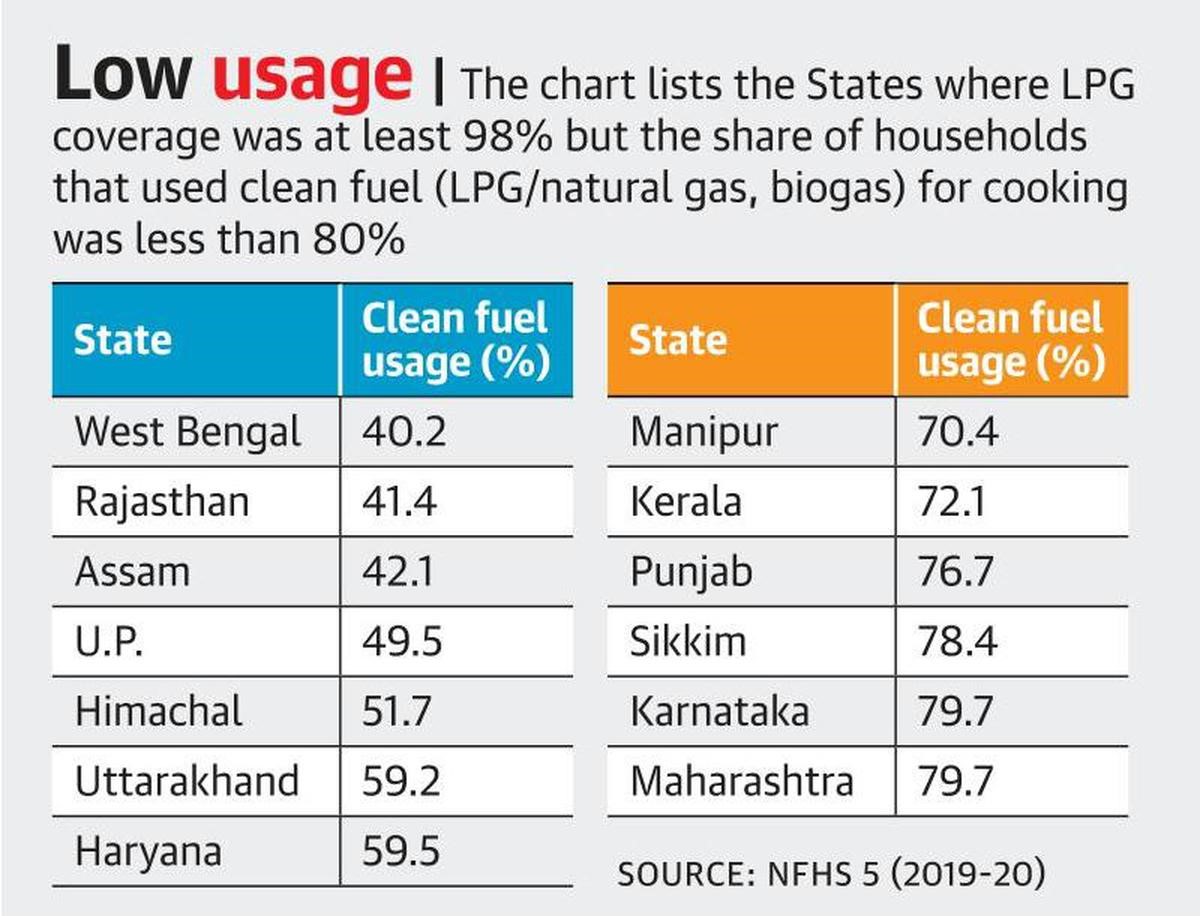[ad_1]

Introduction:
In the last financial year, 90 lakh beneficiaries of present government’s flagship welfare scheme Pradhan Mantri Ujjwala Yojana did not refill their cylinders.
And over 1 crore beneficiaries refilled their cylinders only once. These revelations come in the backdrop of much feted “labharthi” or beneficiary class.
This was revealed in reply to an Right to Information (RTI) application filed by activist to the three oil marketing firms Indian Oil Corporation Limited (IOCL), Hindustan Petroleum Corporation Limited (HPCL) and Bharat Petroleum Corporation Limited (BPCL).
About Pradhan Mantri Ujjwala Yojana:
The scheme was originally launched on May 1, 2016 in Ballia, Uttar Pradesh by PM Narendra Modi with a target of releasing 8 crore connections by March 2020.
Pradhan Mantri Ujjwala Yojana is a scheme of the Ministry of Petroleum & Natural Gas for providing LPG connections to women from Below Poverty Line (BPL) households.
So far over 9 crore connections under Pradhan Mantri Ujjwala Yojana has been released.
The PMUY 2.0 was launched in financial year 2021-22 making a provision for release of additional one crore connections.
Impact of household air pollution:
WHO mentions the impact of household air pollution that is caused by unclean cooking fuel, on health. It mentions that of 3.8 million deaths due to this pollution:
- 27 percent of deaths are due to pneumonia.
- 18 percent of deaths are due to stroke.
- 27 percent of deaths are from ischaemic heart disease
- 20 percent of deaths are from chronic obstructive pulmonary disease (COPD)
- 8 percent of deaths are from lung cancer.
Need of launching the Pradhan Mantri Ujjwala Yojana:
- In India, the poor have limited access to cooking gas (LPG). The spread of LPG cylinders has been predominantly in the urban and semi-urban areas with the coverage mostly in middle class and affluent households.
- But there are serious health hazards associated with cooking based on fossil fuels.
- According to WHO estimates, about 5 lakh deaths in India alone due to unclean cooking fuels.
- Most of these premature deaths were due to non-communicable diseases such as heart disease, stroke, chronic obstructive pulmonary disease and lung cancer.
- Indoor air pollution is also responsible for a significant number of acute respiratory illnesses in young children.
- According to experts, having an open fire in the kitchen is like burning 400 cigarettes an hour.
Beneficiaries of PMUY enhanced the positive multiplier effect till now:
- Providing LPG connections to BPL households will ensure universal coverage of cooking gas in the country.
- This measure will empower women and protect their health. It will reduce drudgery and the time spent on cooking. It will also provide employment for rural youth in the supply chain of cooking gas.
- According to the RTI replies, Indian Oil Corporation, for the connections released by them up till March 2021, 65 lakh customers have not refilled their connections during the last financial year.
- The figures for Hindustan Petroleum Corporation and Bharat Petroleum Corporation are 9.1 lakh and 15.96 lakh.
- Bharat Petroleum Corporation specified that the figure of 15.96 lakh is only for the connections released up to September 2019, which was the first round of the Ujjwala yojana.
- As per a reply filed by the government in Lok Sabha, in March this year, the LPG consumption under the Ujjwala Yojana remains 3.66 refills per connection annually.
COVID effect: Three free of cost LPG refills to PMUY beneficiaries:
These figures should also take into account the fact that during the COVID-19 pandemic, the government provided up to three free of cost LPG refills to PMUY beneficiaries from April 1, 2020 and this was extended up to December 31 2020.
PMUY beneficiaries have availed 14.17 crore free refills under the Scheme, across the country, as per the same reply filed by Union Petroleum Ministry in Lok Sabha.
Critical arguments:
While the scheme was started with a good intent it has inherent flaws which the government has failed to address.
The people are shocked to realise that they have pay the full amount even under the scheme for the subsequent cylinders.
The subsidy is transferred into their accounts by the oil marketing firms. While the firms claim that they have disbursed the subsidy we don’t know whether it reaches the beneficiaries on time.
The cylinders thus end up being used as show piece in their homes or sparingly used.
Ujjwala 2.0 Scheme:
In 2021, the Prime Minister launched the second phase of Pradhan Mantri Ujjwala Yojana (PMUY) or Ujjwala 2.0 Scheme.
He mentioned plans to promote “gobar dhan” – tapping cow dung for energy on the occasion of World Bio Fuel Day (10th August).
Ujjwala is part of the ambitious agenda for behavioral change that will help India transit to a $5 trillion economy by 2024.
However, the challenges need to be addressed:
Low Consumption of Refills:
Encouraging the sustained usage of LPG remains a big challenge, and low consumption of refills hindered recovery of outstanding loans disbursed under the scheme.
The annual average refill consumption on 31th December 2018 was only 3.21.
System Anomalies:
There are deficiencies such as the issuance of connections to unintended beneficiaries, and problems with the software of the state-run oil marketing companies for identifying intended beneficiaries and inadequacies in the deduplication process.
Conclusion:
The scheme should be extended to poor households in urban and semi-urban slum areas.
There is a need for achieving a higher LPG coverage of the population by providing connections to households that do not have LPG.
The positives are ‘Give it up’ campaign, LPG Panchayat etc have been remarkable in bringing in behavioral changes.
Target beneficiary expansion and identification must be carried out carefully to eliminate fake accounts and corrupt use of the scheme.
Government needs to ensure and provide subsidies refills and that rural households are able and willing to pay for them.
This enhances their health and quality of life, as well as urban air quality. It is a social investment.
[ad_2]

